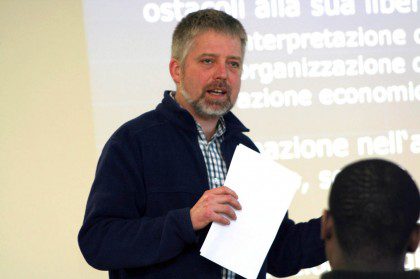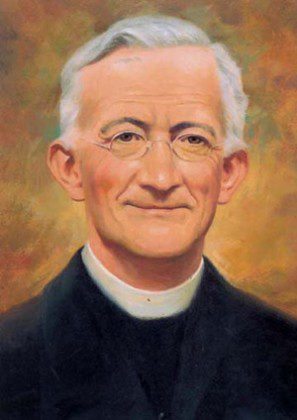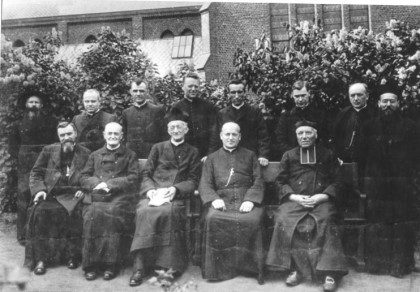
Fr. Leo John Dehon, founder of the Priests of the Sacred Heart, was born March 14, 1843. In many parts of the congregation, the anniversary of his birth is celebrated as “Founder’s Day;” a day to remember the roots of the congregation. Typically, the superior general writes a letter to commemorate the day.
This year the letter takes the form of an imagined “interview” with Fr. Dehon envisioned by Fr. Stefan Tertünte, a member of the German Province. Fr. Stefan has done extensive study on the founder and often teaches classes on both Fr. Dehon, and the early years of the congregation. Most recently, he was one of the presenters in the international formation program in Rome.
The introduction to the interview, which focuses on a year of great challenge for both the founder and the Priests of the Sacred Heart, is written by Fr. José Ornelas Carvalho, SCJ, superior general.
—————-
Rome, February 25th, 2011
Dear Confreres,
Celebrating the birthday of a person who was greatly loved is to acknowledge that his life was a gift from God to us. March 14, Fr. Dehon’s birthday, deserves to be gratefully celebrated along with prayers for new vocations, religious and lay, that can carry on the charism he left us. His birthdate can also serve to promote a deeper and richer knowledge of his personality and the profound faith experience our Founder had.
This year we invite the entire Dehonian Family to revisit a basic aspect of our Dehonian charism with the help of an interview prepared at our request by Fr. Stefan Tertünte (GE) and to whom we are extremely grateful. We want to recall what Fr. Dehon had written about this topic in 1910: ”I was led by Providence to walk down various pathways but two of them left a profound impression on me: Christian social action and the life of love, reparation and immolation to the Sacred Heart of Jesus. My books, translated into various languages, have allowed this twofold current flowing from the Heart of Christ to reach everywhere. Thanks be to God (NQT XXV /1910, 33).
We also say Thanks be to God in our own day for the birth of Fr. Dehon, for his vocation and mission. We thank the Lord for the grace of being the followers of this master and shepherd “who was always concerned about being present to the people of his time especially the poorest: those without resources, without reasons to live, without hope” Cst. 52).
We also owe thanks to the Church who continuously proposes its mission in new ways, as it did 40 years ago in the Synod of Bishops in 1971: ”Working for justice and participating in the transformation of the world clearly appear to us as a constitutive dimension of preaching the Gospel” (Justice in the World, 6).
-Fr. José Ornelas Carvalho, SCJ, superior general
—–
Very reverend Fr. Dehon, we shall shortly celebrate your 168th birthday. Perhaps it might be an opportunity to consider some topics that were close to you as founder from a somewhat distant point of view.
Son, my age no longer allows me lengthy interviews, but if you are willing to restrict yourself to a few key topics…
Let’s begin with a very simple question: which year was the most difficult for you as founder of a congregation?

Well, naturally, you know that as founder of a congregation I was always dealing with problems: preserving the independence of the community present in various dioceses was a constant battle; fiscal problems were my companions to the end of my life; recognition by Rome was extremely difficult; the quality of new members left something to be desired. These are all problems that face a young community – and I believe we faced and handled them rather well. However, the challenges over what direction and what character to give the congregation was the source of great delusion and had serious consequences. Thus, for me, I would say that, as founder, the year 1897 was the most difficult.
But, 1897 was also a great year for you! The conferences at Rome on the Christian vision of society had an impact even in France; your work through congresses, articles, various meetings with leading Catholic French intellectuals on behalf of Christian democracy and for having Catholics accept the republican government; your election at Lyons as a member of the national council of the Christian Democrats; the publication of your two books, Our Congress and Papal Directives…
Yes, sure, this is all true. But you asked me what my most difficult year as founder of a congregation was. Clearly, I can say that 1897 was filled with personal successes. I found I was comfortable as founder. It was my great desire that the congregation would participate more intensely in the great challenges that were to be found in the social field and in society of that era generally: participate and get involved. At any rate, the apostolate to the workers that took place under Fr. Charcosset at Val-de-Bois was among our first endeavors and Fr. Rasset was occupied for many years at Saint Quentin with young workers. In 1891, in fact, I wrote a letter to Pope Leo XIII informing him of the plan that congregation had for forming men to work in our specific apostolate with large factories and worker living quarters and I would like to have been involved in their training both at the university as well as at the factory of Val-de-Bois.
Already in 1895, I had a conversation with the Pope about being a congregation whose first priority was teaching in the social field, the apostolate to workers, and the missions. However, not much later, in 1897, I learned that the greater part of the membership did not share my perspective, and, worse, were unable to share in it.
From the very beginning there was some resistance to you as Founder, at the beginning of 1890, for example.
True! At the general chapter of 1893, some members tried to prevent my re-election as superior general. At that time they reproached me with substandard leadership of the congregation. Their attempt failed at the time but tensions within the congregation prevailed. In 1897, another attempt at a split took place which again failed. This time, however, it became clear that this was not a matter of the quality of my leadership. What was at stake was the character of our congregation, our very charism in fact.
Are you referring to the letter of Fr. Blancal and five other members?
Exactly. In effect, it was more a manifesto than a letter. To be fair, too, the document was very honest and clearly set forth the problems. For the co-signers what was at stake was their concern about the true vocation of our congregation. They had entered a community that they thought was dedicated to personal sanctification through devotion to the Sacred Heart in reparation for the countless acts of ingratitude particularly by priests and religious toward God’s love. As far as an apostolic work was concerned, they paid special attention to perpetual Eucharistic adoration, parish missions, and retreats. All the rest was, in their words, secondary and which we could do less of. They saw this vocation betrayed by me in the rapid growth of the congregation, expansion into distant countries, and involvement in current social problems. Reasonably then, they were seeking separation.

But even this attempt to break apart failed, despite all efforts. Shortly thereafter several co-signers even asked forgiveness. In the end you won out, didn’t you, Fr. Dehon?
It’s not a question of winning or losing. What we were engaged in was setting forth how, in what specific way, our congregation was to serve the church and the world. In the early years following our foundation, I probably would have given my unqualified approval to the description of our vocation that was set forth by Fr. Blancal and the other co-signers. But I believe that we would not then have understood what God was asking of us with and through the congregation.
And after Fr. Blancal’s letter, what you considered to be the charism of the congregation was clearer?
Receiving this letter made me aware that these men and many other members did not understand the path I followed and were not willing to walk it as members of the congregation. And this path has a logic that flows from the core of our spirituality, from our faith experience – and today this is all clearer to me than it was then. As far as I am concerned, involvement in politics, in a more just society, the desire to have priests devoted to the labor movement were not mere adjuncts that one could do or not do without affecting the essence of our vocation.
Perhaps a number of members thought that your involvement in social and political activity was, in a sense, your personal interest and passion, but not something specifically pertaining to the congregation?
The letter of Fr. Blancal shows that the members had a clear understanding that such involvement and engagement should also characterize our congregation. After 1897, I said nothing about the matter. Only in 1912, 35 years after the foundation of the congregation, did I write a letter to all the members, my spiritual testament so to speak, in which once again I highlighted the two apostolates that were closest to my heart: to bring people to the Love of the Sacred Heart and to promote a more just society for workers and the most disenfranchised. How much these two things were part of my makeup and from which I could not divorce myself, I was only able to express much later in my life, even though I already lived them in the ‘90’s, which were years that were very busy for me. A number of members happen to overlook a small word in my statement.
And what would that word be?
The word “and.” Many members are pious and active in pastoral works. During the course of our history, some got involved with great generosity in serving the most oppressed and weakest, but very few dedicated themselves to acquiring competency in the field of social doctrine and analysis about the systems and perceptions found in our societies. Frequently, the members choose between one or the other apostolate. But, for me, the two go together.

Many people today, including our members, would ask what does social engagement have to do with piety.
My conviction and experience was always telling me that the Love of Christ wanted to change the world, from its tiniest private aspects to its much wider social dimensions. It would certainly have been simpler to limit myself to parish work and parish missions. It would have been simpler to say that society is going off on a wrong tangent and we will not follow that path. But would we have remained faithful to the dynamic demands of Christ? I don’t think so.
For a long time your thrust was directed toward a society governed by a Christian monarch as the visions of Margaret Mary Alacoque sought.
For a long time, I personally was a dreamer in a period when things had already changed; I thought about the good old days when Christianity affected every aspect of the social order. Yes, indeed, this thinking still holds some fascination for me even today. And for a long time I stood in support of Catholics who were involved with returning to yesterday’s social order. We used to be called counter-revolutionaries in those days. But Christ always lived in the present, loved it, changed and improved it. At a congress at Bourges in 1900, I asked the priests there: have we loved today’s society enough or have we withdrawn from it with a pout on our faces? That question is still open today.
It seems that in your lifetime you have undergone a notable evolution.
Exactly. As a student and young priest I was an ardent defender of the monarchy. Yet, the price of return would have been great and this became clear to me over time. It is not so important that a country be governed by a monarch, a president, or a parliament. What is important is that justice and solidarity assure that all citizens have life with dignity. The French people wanted a republic – my duty was to work for a republic that would be as Christianized as possible and in which the church would be recognized for its alliance with the weak, the workers, in their hope for justice.
If my understanding is correct, you paid a very high price for your stance: friends who left you and members who did not understand you…
From the time I was a young student and then priest I never thought that I would one day be criticized and rejected by a bishop for being “an obstinate republican.” Yes, it’s true that the “democratic priests” like Lemire, Naudet, Six, myself and others, were not looked upon very well in many parts of the French Catholic world. Even with men like La Tour du Pin, whose friend I was, our contacts were reduced because he remained a monarchist and did not want to dirty his fingers in the new society. Today, when I read what I wrote in the 1890’s in various articles, letters, speeches and books, I am rather surprised myself at my turnabout and the clarity of my positions. However, I repeat: Christ never ended up in a social ghetto to pout – he would have had to renounce his incarnation. He stood side-by-side with simple men that were looked down upon and marginalized. I tried to do the same thing.
By saying “Yes” to the French republic and your attention to Christian Democracy, didn’t you betray the spirit of Paray-le Monial and Margaret Mary Alacoque?

The message of Paray-le-Monial was a rather political message right at the outset. In her letter to the king of France, Margaret Mary Alacoque speaks rather clearly about a devotion to the Sacred Heart that would effectively provide relief for society. Within it there is no trace of any restriction to the private sphere; yet Margaret Mary was not at time facing a society in which access to power and its exercise was totally separated from the church and in which monarchs had no role. It became very clear to me: only at the side of the people, only in a republic sought by the people, would it be possible to remain faithful to the social relevance of devotion to the Sacred Heart – as Mary Mary Alacoque requested. No, I certainly did not betray Margaret Mary; perhaps I took a step beyond her – but is there any other way when the world has changed so much since the time of Margaret Mary?
—–
Dear brothers and sisters of the Dehonian Family, clearly the world is changing. Let us, too, take some new steps and align ourselves according to the Heart of Christ with Fr. Dehon in service to society. Let us pray for this and ask others for prayer, too, to grow in fidelity to our Dehonian charism; may the Lord of the harvest raise up new vocations in our communities and in our families.
-Fr. José Ornelas Carvalho
